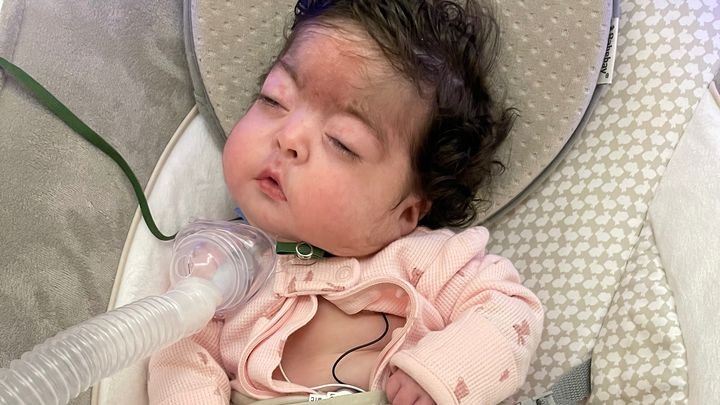
Support Natalia's Bohring-Opitz Syndrome Journey
Donation protected

Thank you for taking the time to read about Natalia’s story.
Our daughter, Natalia, was born prematurely on August 2024, and was diagnosed with the rare Bohring-Opitz Syndrome shortly thereafter. This condition severely impacts her breathing and overall health, affecting only about 800 children worldwide. Natalia faces imminent challenges, including necessary surgeries like a tracheostomy, GI tube, etc. Her future is uncertain, and medical expenses are overwhelming. After several months in the hospital, she requires ongoing care with no discharge date in sight. Doctors anticipate she may be nonverbal with limited mobility. We appeal to compassionate families for support to manage current and future medical costs. Your generosity means everything to our beloved Natalia.

Our angel is bravely fighting to gain weight and grow, facing the challenges of Bohring-Opitz Syndrome, which includes a heightened risk of kidney cancer and uncertain life expectancy. Born premature, she's enduring a difficult journey with ongoing medical needs and upcoming surgeries. Your support during these uncertain days is invaluable as we navigate her care and medical expenses. Every contribution, no matter the size, helps secure Nathalia's future and provides hope during this challenging time. Thank you for standing with us in this journey of love and resilience.

Bohring-Opitz syndrome (BOS) is a rare genetic disorder that affects many parts of the body, including the brain, heart, and digestive system:
Growth: People with BOS are often very small due to severe growth restrictions.
Development: BOS can cause developmental delay and profound intellectual disability. Most people with BOS don't develop typical speech or walking abilities.
Feeding: Feeding difficulties are common, and many babies require early tube feeding. Feeding improves with age.
Seizures: Seizures are common and are usually treated with epileptic drugs.
Heart: Heart anomalies are common, and can include septal defects, patent ductus arteriosus, pulmonary stenosis, and heart muscle hypertrophy.
Brain: Some people with BOS have changes to the brain stem, which controls movement, feeling in the face, and other functions.
Other features: Other features include distinctive facial features, a red or pink birthmark on the forehead or eyelids, and a characteristic posture with bent elbows and angled wrists.
BOS is caused by changes in the ASXL1 gene. It can be inherited in an autosomal dominant manner, but most people with BOS don't reproduce due to developmental and neurological impairments.
Español
Gracias por tomarse el tiempo de leer la historia de Natalia.
Nuestra hija, Natalia, nació prematuramente en agosto de 2024 y poco después le diagnosticaron el raro síndrome de Bohring-Opitz. Esta afección afecta gravemente su respiración y su salud general, afectando solo a unos 250 niños en todo el mundo. Natalia enfrenta desafíos inminentes, incluyendo cirugías necesarias como una traqueotomía, una sonda gastrointestinal, etc. Su futuro es incierto y los gastos médicos son abrumadores. Tras varios meses en el hospital, requiere atención continua sin fecha de alta a la vista. Los médicos prevén que podría no hablar y tener movilidad limitada. Apelamos a las familias compasivas para que nos apoyen y nos ayuden a afrontar los costos médicos actuales y futuros. Su generosidad lo es todo para nuestra querida Natalia.
Nuestro ángel lucha valientemente por ganar peso y crecer, enfrentando los desafíos del síndrome de Bohring-Opitz, que incluye un mayor riesgo de cáncer de riñón y una esperanza de vida incierta. Nacida prematuramente, está atravesando un difícil camino con constantes necesidades médicas y próximas cirugías. Su apoyo durante estos días de incertidumbre es invaluable mientras gestionamos su atención y sus gastos médicos. Cada contribución, sin importar la cantidad, ayuda a asegurar el futuro de Nathalia y brinda esperanza en estos momentos difíciles. Gracias por acompañarnos en este camino de amor y resiliencia.
El síndrome de Bohring-Opitz (SBO) es un trastorno genético poco común que afecta muchas partes del cuerpo, incluyendo el cerebro, el corazón y el sistema digestivo:
Crecimiento: Las personas con SBO suelen ser muy pequeñas debido a graves restricciones de crecimiento.
Desarrollo: El Síndrome de Bohring Opitz puede causar retraso en el desarrollo y discapacidad intelectual profunda. La mayoría de las personas con SBO no desarrollan habilidades típicas para hablar o caminar.
Alimentación: Las dificultades para alimentarse son comunes y muchos bebés requieren alimentación por sonda desde temprana edad. La alimentación mejora con la edad.
Convulsiones: Las convulsiones son comunes y generalmente se tratan con medicamentos antiepilépticos.
Corazón: Las anomalías cardíacas son comunes y pueden incluir defectos del tabique nasal, conducto arterioso persistente, estenosis pulmonar e hipertrofia del músculo cardíaco.
Cerebro: Algunas personas con SBO presentan alteraciones en el tronco encefálico, que controla el movimiento, la sensibilidad facial y otras funciones.
Otras características: Otras características incluyen rasgos faciales distintivos, una marca de nacimiento roja o rosada en la frente o los párpados, y una postura característica con codos flexionados y muñecas en ángulo.
El SBO se debe a alteraciones en el gen ASXL1. Puede heredarse de forma autosómica dominante, pero la mayoría de las personas con SBO no se reproducen debido a deficiencias neurológicas y del desarrollo.
Organizer
Juan Rubio
Organizer
Wallingford, CT